Are you a busy pregnant mom struggling to find time for a healthy breakfast? Look no further! Breakfast is the most important meal of the day, especially during your first trimester, and throughout your pregnancy.
During the first trimester, you may experience morning sickness and food aversions, making it difficult to eat a balanced meal.
So we’ve compiled a nice little list of nutritious and delicious recipes that are perfect for your growing belly.
Plus they’re easy to prepare!
Why Eat Breakfast During Pregnancy?
Eating breakfast during pregnancy is like laying the foundation for a healthy day for both you and your baby.
It kick-starts your metabolism, providing the much-needed energy to tackle the day while supplying essential nutrients that support your baby’s growth and development.
Skipping breakfast can lead to prolonged fasting, which might not only leave you feeling sluggish but could also affect your blood sugar levels.
Plus, a nutritious morning meal helps in managing morning sickness by stabilizing your stomach with gentle, wholesome foods.
What To Look For In Healthy Breakfast Ideas for Pregnancy

When scouting for healthy breakfast ideas during pregnancy, focus on nutrient density and balance.
Look for meals rich in essential nutrients like folic acid, iron, calcium, and protein, which are crucial for your baby’s development.
Opt for whole grains and fiber-rich options to aid digestion and prevent constipation. Include a variety of fruits and vegetables to ensure a range of vitamins and minerals.
Additionally, ensure your choices are easy to prepare and gentle on the stomach, especially important if you’re dealing with morning sickness.
Remember, a well-rounded breakfast not only fuels your day but also supports your baby’s growth and development.
Key Nutrients You Need
During the first trimester, your baby’s major organs and body systems are forming, which means that they need a variety of nutrients to support their growth.
Here are some of the most important nutrients to focus on during this stage of pregnancy:
- Folic Acid: This B vitamin is crucial for preventing birth defects of the brain and spine. You can get folic acid from fortified cereals, leafy green vegetables, and citrus fruits.
- Iron: Your body needs more iron during pregnancy to make extra blood for your growing baby. Good sources of iron include lean red meat, poultry, fish, beans, and fortified cereals.
- Calcium: Calcium is essential for building strong bones and teeth. Good sources of calcium include dairy products, leafy green vegetables, and fortified foods.
- Vitamin D: Vitamin D helps your body absorb calcium and is essential for bone health. You can get vitamin D from sunlight, fortified milk, and fatty fish.
Caloric Intake Considerations
During the first trimester, you don’t need to eat significantly more than you did before you were pregnant.
However, it’s important to make sure that you’re getting enough calories to support your baby’s growth and development.
Here are some general guidelines to keep in mind:
- Aim for an extra 300-400 calories per day: This is equivalent to a healthy snack, such as a piece of fruit with nut butter or a small smoothie.
- Focus on nutrient-dense foods: Make sure that the extra calories you’re consuming come from healthy, nutrient-dense foods such as fruits, vegetables, whole grains, lean protein, and healthy fats.
- Listen to your body: During the first trimester, you may experience nausea and vomiting, which can make it difficult to eat. If you’re struggling to keep food down, focus on eating small, frequent meals throughout the day and talk to your healthcare provider about ways to manage your symptoms.
Safe, Healthy, and Delicious Breakfast Foods
Whole Grains and Fiber-Rich Options
Whole grains are an excellent source of fiber, which can help keep you regular and prevent constipation, a common complaint during pregnancy.
Some good options are:
- Whole grain toast with avocado or nut butter
- Oatmeal with fruit and nuts
- Whole grain cereal with milk or yogurt
Protein Sources for Morning Meals
Protein is essential for the growth and development of your baby, and it can also help keep you feeling full and satisfied throughout the morning.
Here are our favorite protein-rich breakfast options:
- Scrambled eggs with whole grain toast
- Greek yogurt with fruit and nuts
- Smoothie with milk or yogurt, fruit, and protein powder
Dairy and Non-Dairy Calcium-Rich Foods
Calcium is important for the development of your baby’s bones and teeth, and it can also help keep your own bones healthy.
Some calcium-rich breakfast options:
- Milk or yogurt with whole grain cereal
- Smoothie made with milk or yogurt and fruit
- Non-dairy milk fortified with calcium, such as soy or almond milk
Remember to always wash your fruits and vegetables before eating them, and to cook your eggs and meats thoroughly to reduce the risk of foodborne illness.
With these healthy and delicious breakfast options, you can start your day off right and give your baby the nutrients they need to thrive.
Quick And Easy First Trimester Breakfasts
Quinoa Breakfast Bowl
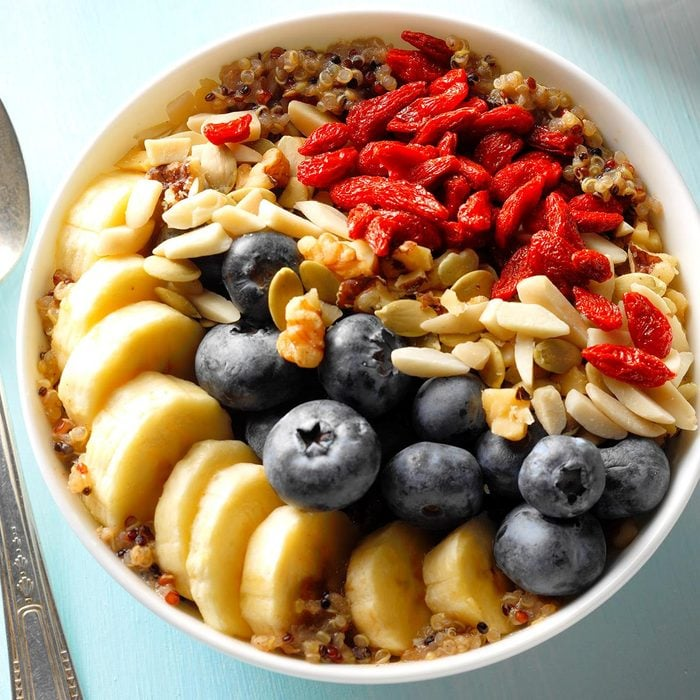
A protein-rich and versatile breakfast option, a quinoa breakfast bowl can be topped with fruits, nuts, and a bit of honey for a sweet start.
It’s not only nutritious but also keeps you full for longer. Get Recipe Here.
Smoothies and Shakes
Smoothies and shakes are a great way to start your day. They are quick, easy to make, and can be packed with nutrients. Here are some ideas for smoothies and shakes:
- Banana and peanut butter smoothie: Blend one banana, one tablespoon of peanut butter, one cup of milk, and a handful of ice cubes.
- Green smoothie: Blend one banana, one cup of spinach, one cup of milk, and a handful of ice cubes.
- Chocolate protein shake: Mix one scoop of chocolate protein powder, one cup of milk, and a handful of ice cubes.
Cottage Cheese with Pineapple
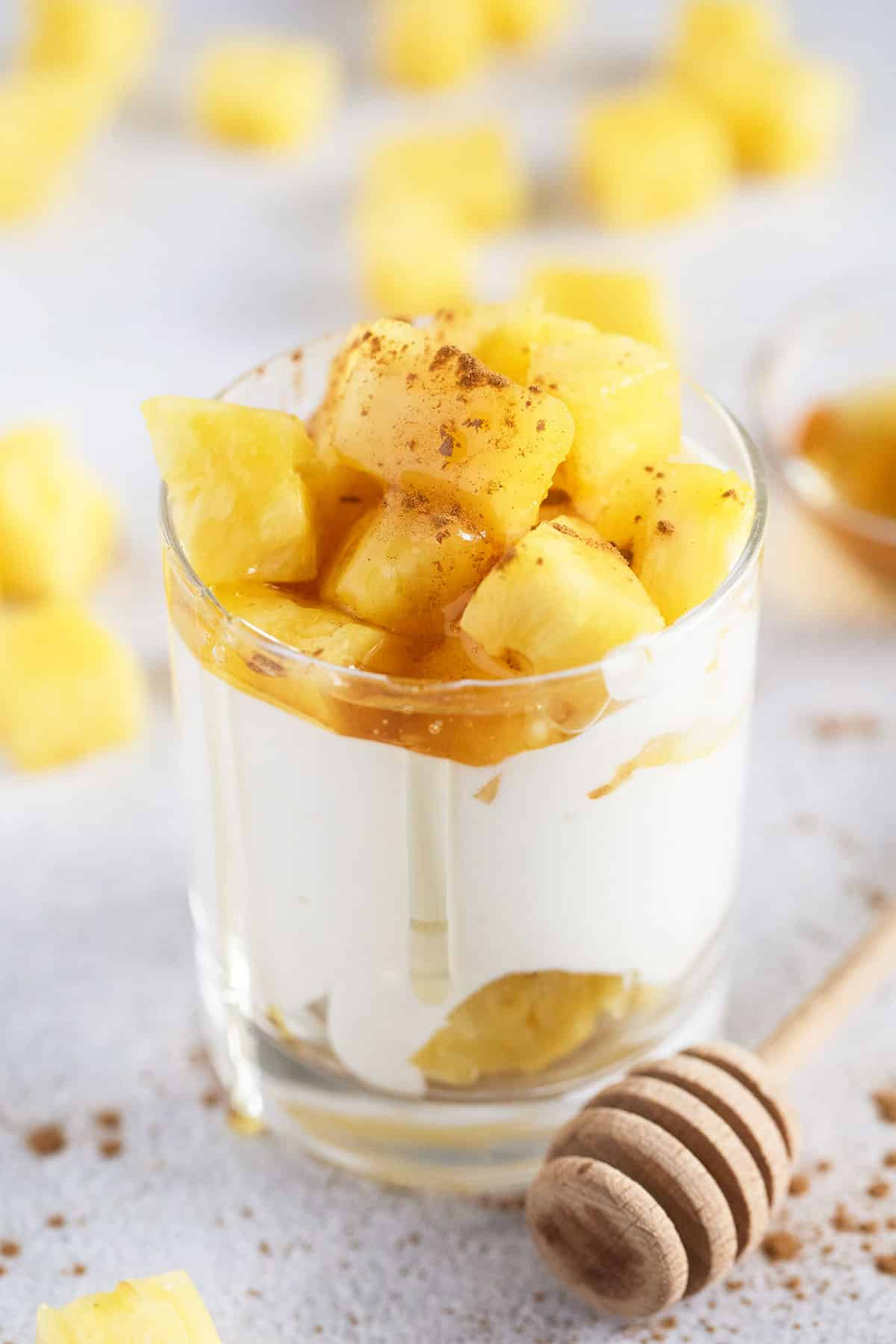
Cottage cheese is a good source of calcium and protein, and when combined with pineapple, it offers a refreshing and nutritious meal.
It’s light, yet fulfilling, perfect for those mornings when you want something easy on the stomach. Get Recipe Here.
Overnight Oats and Chia Puddings
Overnight oats and chia puddings are perfect for busy mornings.
You can prepare them the night before and grab them on your way out the door. Here are some ideas for overnight oats and chia puddings:
- Peanut butter and banana overnight oats: Mix one cup of rolled oats, one tablespoon of peanut butter, one sliced banana, and one cup of milk. Let it sit in the fridge overnight.
- Blueberry chia pudding: Mix one cup of milk, three tablespoons of chia seeds, and one cup of blueberries. Let it sit in the fridge overnight.
- Chocolate overnight oats: Mix one cup of rolled oats, one tablespoon of cocoa powder, one tablespoon of honey, and one cup of milk. Let it sit in the fridge overnight.
Vegetable Frittata
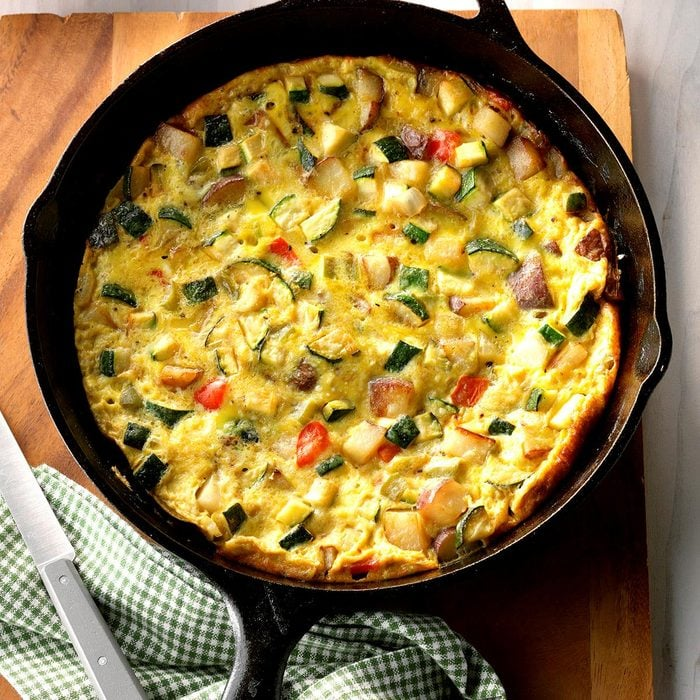
Eggs are a fantastic source of protein and essential nutrients.
A vegetable frittata, loaded with your choice of vegetables, provides a well-rounded, nutritious meal to start your day. Get Recipe Here.
Avocado Toast Variations

Avocado toast is a trendy and delicious breakfast option.
It is also packed with healthy fats and nutrients. Here are some ideas for avocado toast variations:
- Classic avocado toast: Toast one slice of bread and spread half an avocado on top. Sprinkle with salt and pepper.
- Tomato and feta avocado toast: Toast one slice of bread and spread half an avocado on top. Add sliced tomatoes and crumbled feta cheese.
- Egg and bacon avocado toast: Toast one slice of bread and spread half an avocado on top. Fry one egg and two slices of bacon and place them on top of the avocado.
Omelet + Broccoli + Cheese + Leftover Meat
Omelets are a great way to use up leftover vegetables and meat from dinner.
Make an omelet with broccoli, cheese, and leftover meat for a protein-packed breakfast.
Whole Grain Waffles with Nut Butter and Banana
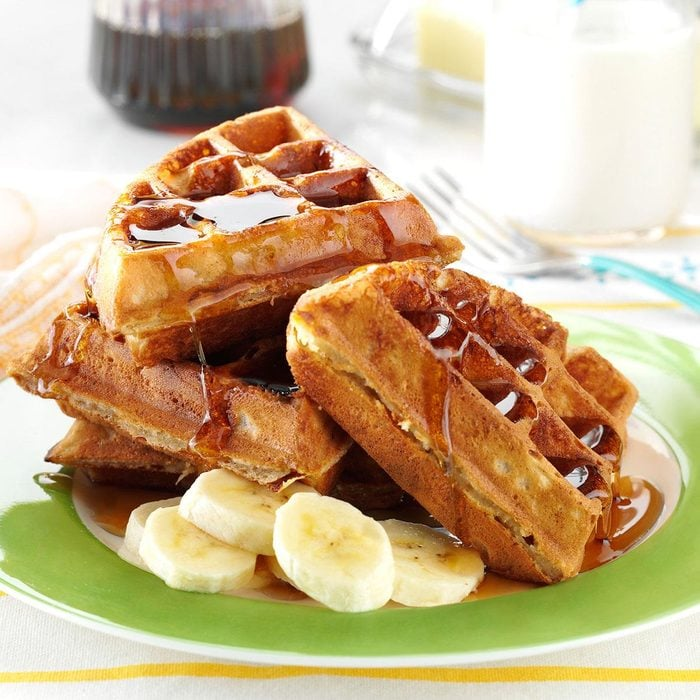
Whole grain waffles topped with nut butter and banana slices offer a balance of fiber, healthy fats, and protein, along with a natural sweetness. Get Recipe Here.
Boiled Egg + Avocado + Gluten-Free Toast
Boil a dozen eggs on the weekend and eat them for breakfast and snacks all week long.
Take your avocado up a level by adding a boiled egg. Serve with gluten-free toast.
Scrambled Eggs + Avocado + Corn Tortilla
This breakfast idea is high in protein and healthy fats. Scramble two eggs and serve with half an avocado and a corn tortilla.
For a heartier breakfast, add a side of black beans.
Sweet Potato and Black Bean Breakfast Burrito
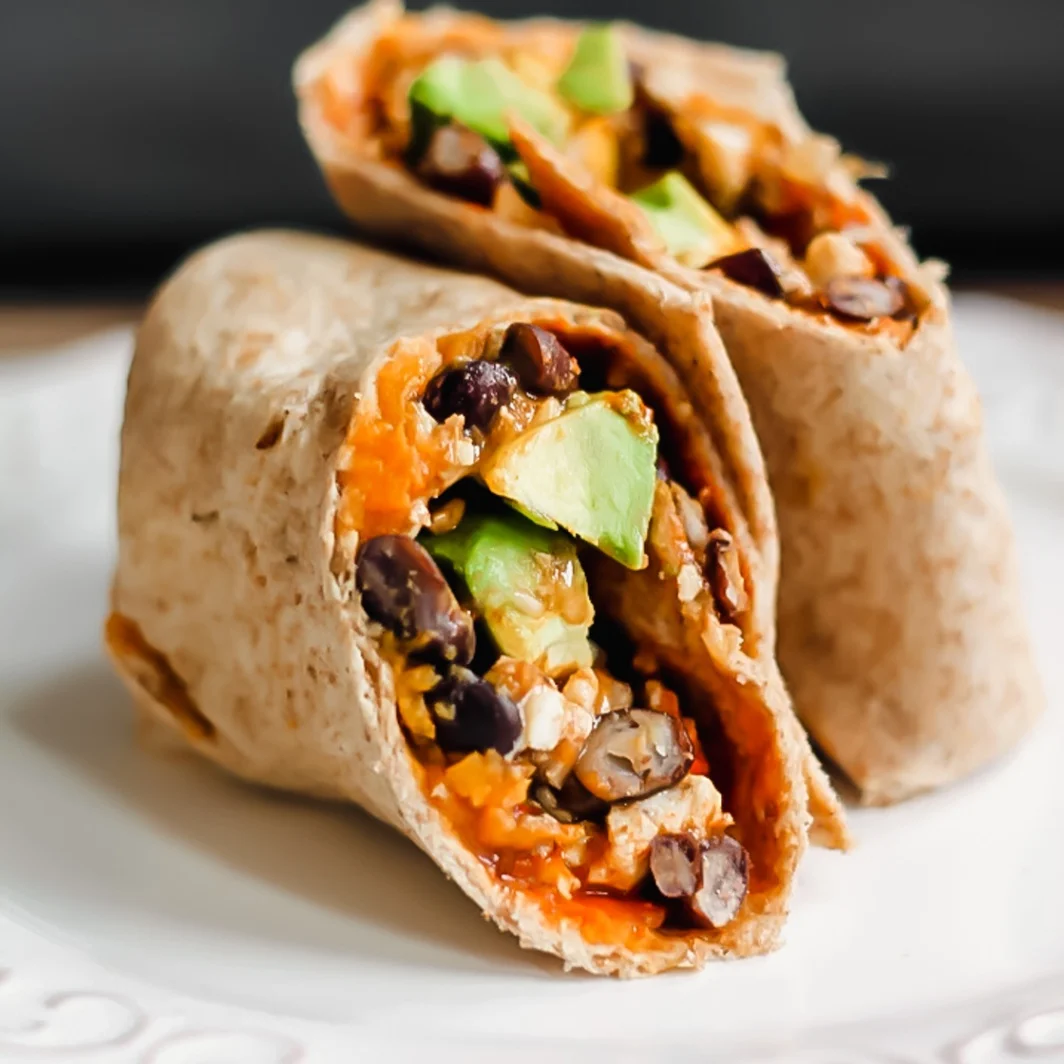
For a savory breakfast, a burrito with mashed sweet potatoes and black beans wrapped in a whole grain tortilla provides a good balance of complex carbs, protein, and fiber.
It’s also a great meal for those on the go.Get Recipe Here.
Oatmeal

Oatmeal is an easy and simple breakfast. The key to making this a healthy pregnancy breakfast is to load your oatmeal with superfoods.
Oatmeal is high in protein, fiber, and can help control blood sugar. Here are a few delicious and healthy oatmeal breakfast ideas:
- Oatmeal + mixed berries + coconut oil + hemp seeds
- Oatmeal + apples + cinnamon + date fruit + flax seeds
- Oatmeal + banana + raisins + chia seeds
- Oatmeal + shredded carrot + coconut flakes + pecans
Soak your oatmeal overnight to make it more digestible.
To make overnight oats, mix 1/4 cup oats, 1/4 cup chia seeds, toppings, and milk or non-dairy milk of your choice in a wide-mouth mason jar or small container.
Store in the fridge until ready to eat.
Managing Morning Sickness
If you’re experiencing morning sickness during your first trimester, it can be challenging to find foods that you can eat without feeling nauseous.
Here are some tips to help you manage your morning sickness and find breakfast ideas that are easy on your stomach.
Ginger-Infused Breakfast Ideas
Ginger is a natural remedy for nausea and can help alleviate morning sickness symptoms. Here are some ginger-infused breakfast ideas to try:
- Ginger tea with toast: Sip on ginger tea while munching on some whole-grain toast with a little bit of butter or jam.
- Ginger smoothie: Blend ginger with some banana, yogurt, and honey for a refreshing and soothing smoothie.
- Gingerbread pancakes: Make some gingerbread pancakes with molasses and spices for a tasty and comforting breakfast.
Mild Flavored Meals for Sensitive Stomachs
If you’re finding that strong flavors are making your morning sickness worse, try these mild-flavored meals:
- Oatmeal with banana: Cook up some plain oatmeal and add some sliced banana for a simple and satisfying breakfast.
- Yogurt with granola: Mix some plain yogurt with granola and a drizzle of honey for a light and refreshing breakfast.
- Egg and cheese sandwich: Make a simple egg and cheese sandwich with a plain English muffin or bagel for a protein-packed breakfast.
Remember to eat small and frequent meals throughout the day to help manage your morning sickness.
Don’t skip breakfast, as it can make your nausea worse.
With these breakfast ideas, you can start your day off right and manage your morning sickness at the same time.
Recipes for a Balanced First-Trimester Diet
Egg-Based Dishes
Eggs are a great source of protein and essential nutrients such as choline, which is important for fetal brain development. Here are some egg-based dishes that you can enjoy for breakfast:
- Scrambled Eggs with Spinach and Feta Cheese: Scramble two eggs with a handful of spinach and a sprinkle of feta cheese. Serve with whole-grain toast and fresh fruit.
- Egg and Veggie Breakfast Burrito: Scramble two eggs with your favorite veggies such as bell peppers, onions, and mushrooms. Wrap in a whole-grain tortilla and top with avocado and salsa.
- Egg and Cheese Sandwich: Toast a whole-grain English muffin and top with a scrambled egg, cheese, and a slice of tomato.
Healthy Pancakes and Waffles
Pancakes and waffles are a delicious breakfast option, but they can be high in sugar and refined flour. Here are some healthy alternatives:
- Oatmeal Pancakes: Mix 1 cup of rolled oats, 1 mashed banana, 2 eggs, and 1/4 cup of milk. Cook like regular pancakes and serve with fresh fruit.
- Whole Wheat Waffles: Mix 1 cup of whole wheat flour, 1 tablespoon of honey, 1 teaspoon of baking powder, 1/2 teaspoon of cinnamon, 1 egg, and 1 cup of milk. Cook in a waffle maker and serve with fresh berries.
- Banana and Peanut Butter Pancakes: Mix 1 mashed banana, 1 egg, 1 tablespoon of peanut butter, and 1/4 teaspoon of baking powder. Cook like regular pancakes and serve with a drizzle of honey.
Food Safety and Avoidance
Foods to Avoid During Early Pregnancy
During the first trimester, it is important to be mindful of what you eat to ensure the safety of your growing baby.
Some foods can pose a risk of foodborne illness or harm to your baby’s development. Here are some foods to avoid during early pregnancy:
- Raw or undercooked meat, poultry, and seafood: These foods can contain harmful bacteria, viruses, and parasites that can cause foodborne illness. Make sure to cook these foods thoroughly to an internal temperature of 165°F (74°C) or higher to kill any harmful bacteria.
- Deli meats and hot dogs: These foods can also contain harmful bacteria and should be heated to an internal temperature of 165°F (74°C) before consumption.
- Raw or unpasteurized milk, cheese, and juice: These foods can contain harmful bacteria and should be avoided. Make sure to choose pasteurized versions of these foods instead.
- Certain types of fish: Some fish contain high levels of mercury, which can harm your baby’s developing nervous system. Avoid fish such as shark, swordfish, king mackerel, and tilefish. Instead, choose fish that are low in mercury, such as salmon, shrimp, and canned light tuna.